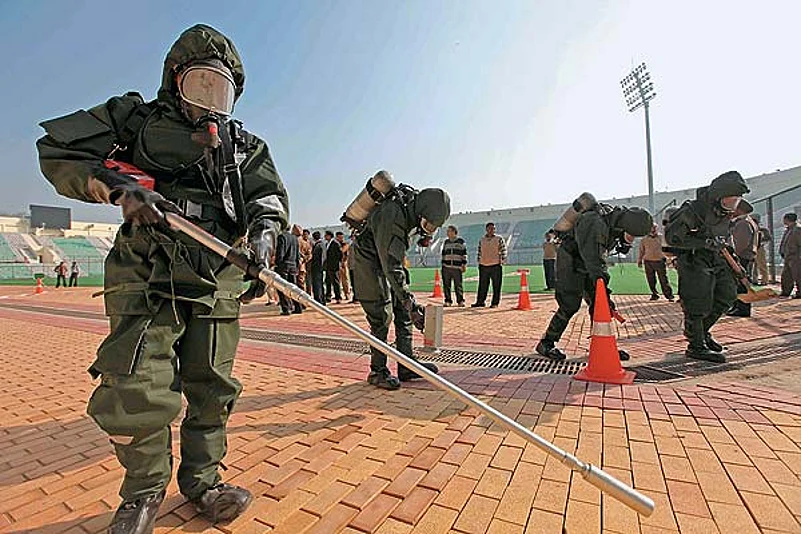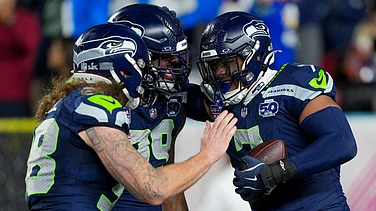An Everest Amongst Hills
World Cup has seen an India long toppled from its golden perch

Click here for large image
***
The fear of terror is real. But as a factor, the utter incompetence of officials runs it close in subverting the avowed objective of staging the Hockey World Cup in India—which is to revive and nurse the sport here back to health. Hockey in India, it was claimed, is still alive and the audience eager, despite the country being left with the crumbs in the last few editions of the tournament. Reports about the demise of the game here have been a constant for years now. But in the face of all this, it was said the World Cup would give a boost to the game, creating the appropriate ambience for a propaganda blitz—just the stuff the media requires to recreate the mass following this sport once enjoyed.
But the weeks before the World Cup, due to begin on February 28, have only brought to the fore the seamier side of Indian hockey—the players suspended training over a pay dispute; there was bickering over who would lead the team; and tickets aren’t available at the designated outlets. Worse, the media has been barred from watching practice sessions or even talking to the players, leading to slanging matches between journalists and officials. Obviously, the suspension of the K.P.S. Gill-led Indian Hockey Federation and the birth of the more ‘democratic’ Hockey India hasn’t ended the mismanagement that has plagued the sport for years now.
“Hockey could have been promoted in a much better way,” says M.K. Kaushik, former men’s team coach who now trains the Indian women’s team. “There are so many people in hockey whose priority is not hockey. They’re in it only for themselves. That’s why other stuff is promoted, hockey is not.” Kaushik isn’t alone in thinking the very purpose of promoting the game has been defeated in the melee. Former Indian star Aslam Sher Khan told Outlook, “This was the time to build up the game, but awareness about the World Cup is way below what it could have been.”
Khan blames sports officials of playing hookey with hockey. He says, “Those who control the game come out only when the news is good. So, when players were on strike, they were sending out only poor, upright A.K. Mattoo (then HI president, he subsequently resigned) before the press. But when the cheque of Rs 1 crore was generously granted by Sahara India, it was Suresh Kalmadi who handed it to the players, donning hockey shorts for the occasion!”
Politics apart, many are puzzled at the exclusion of the media from the Indian team’s training sessions. As former India captain Pargat Singh says, “The game needs publicity, and no secret will be revealed if a few clips of hockey players in training are shown. Their interviews will help people get to know about them. How else can you publicise the sport? Why keep the media out?”
To questions such as Pargat’s, HI president Vidya Stokes had a bland response last week: “It’s due to security concerns.” When told that Delhi Police had no problems in letting the media in, she changed tack, saying the presence of media distracts players. But Stokes was unable to say who had taken this decision. Sports minister M.S. Gill insists the security of players is a valid concern. “This is true for a sports event in India, the subcontinent or the whole world,” he told Outlook. “It’s not an easy job. The Federation of International Hockey (FIH) and the IOA are organising this tournament, they are in control and they have to take the appropriate decisions to give access to media in the given circumstances.”
So was the decision to keep the media out taken owing to pressure from the FIH, rattled as many foreign teams were about security post-Pune? FIH spokesman Arjen Meijer says, “Why would FIH want to disallow journalists from their premier tournament!” Not finding a plausible explanation for the contentious decision, cynics have stepped in.
For instance, Khan says there’s a hidden objective in getting the World Cup to India. What, isn’t the aim to promote hockey? He laughs and says, “The event is happening in India because, after reduction in non-essential corporate spending around the world, ours is the country with the greatest potential for sponsorship in hockey!” Hero Honda is the principal sponsor of the Cup, and there are associate sponsors such as the Steel Authority of India Ltd. “India is a milk cow.... Yahan paisa dene waale log hain, aur paisa khaane waale log bhi hain!”
Khan’s thesis is that those in the IOA or the government are keen on the tournament only for self-betterment and recognition. It isn’t their priority to promote hockey; it doesn’t matter to them if the media is kept out. “It’s not a question of the national pride for them, it’s only about what they do for themselves by getting associated with a sport they have no clue about,” he argues.
Khan says hockey administration is controlled by politicians and bureaucrats who are in it for the money and foreign tours. He declares, “They’re destroying sports in our country. Take Vidya Stokes. Everyone knows she has no clue about hockey. Why is she with hockey? Only because at one stage she was given a post in women’s hockey.” Adds Kaushik, “You can’t ignore political people, because they can help. But right now, we’re being used.” Anyway, politicians aren’t going away, irrespective of their ways. Stokes, now 83, boasted recently, “We will be back after the elections of HI (no date is fixed for that)”.
When sporting non-entities run hockey, it’s not surprising that the stars suffer—for instance, Ajit Pal Singh, who captained the 1975 World Cup-winning team, was stopped at the gates of the National Stadium recently. And this when he’s now a government nominee at the event. No wonder the World Cup has had no impact on budding players. Sarmad Mahmud, who’s been promoting hockey in Uttar Pradesh for several years, told Outlook, “I think the World Cup will bypass the grassroots completely.”


























